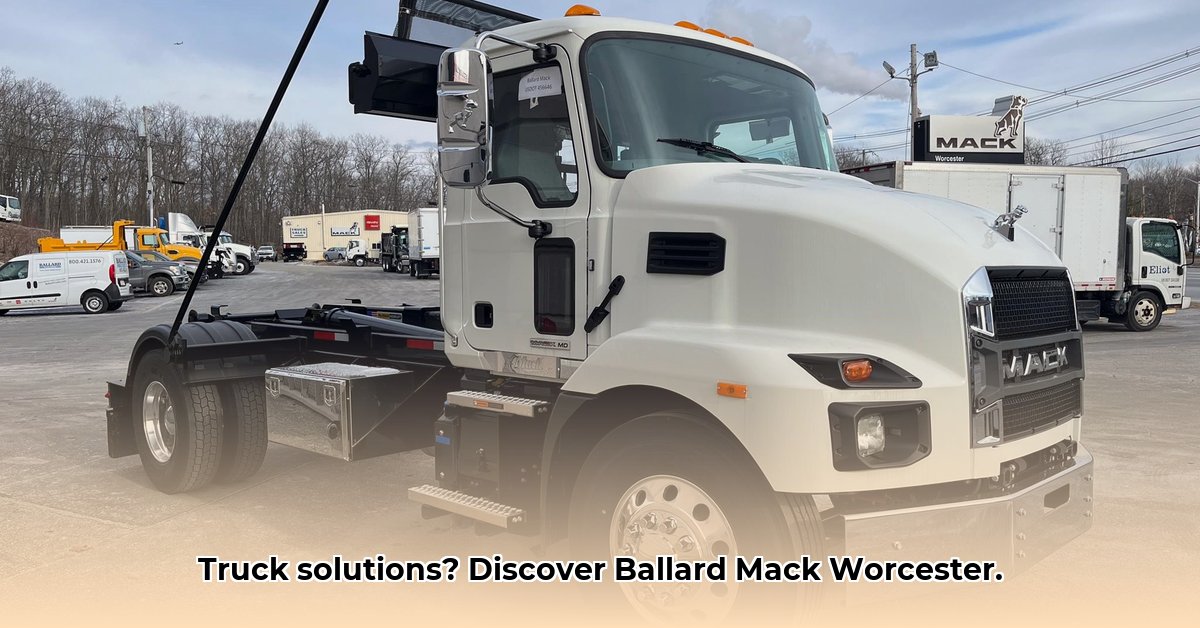
Ballard Mack: A New England Trucking Powerhouse
Ballard Mack, with its flagship location in Worcester, Massachusetts, has been a driving force in New England's trucking industry for over 30 years. More than just a dealership, Ballard provides comprehensive trucking solutions, establishing itself as a trusted partner for businesses across the region. This case study analyzes Ballard's market position, strategic challenges, and opportunities, providing insights for potential customers, industry analysts, and Ballard's internal stakeholders. For financing options, consider exploring financing options.
Company Overview: A Legacy of Service
Since 1988, Ballard Mack has built a reputation for reliability and expertise. Their eight locations across New England offer a full suite of services, including new and used truck sales (Mack, Volvo, Isuzu, and Hino), parts, service, leasing, and rentals. This comprehensive approach addresses the diverse needs of the New England trucking market. Ballard's success stems from a commitment to building long-term customer relationships and understanding the unique challenges of the regional landscape.
Market Analysis: Navigating New England's Trucking Landscape
The New England commercial trucking market presents significant challenges and opportunities. Key trends include:
- The Truck Shortage: A persistent lack of available new and used trucks adds pressure to delivery timelines and increases costs. This scarcity necessitates proactive inventory management and strategic partnerships with manufacturers. How can Ballard effectively mitigate this ongoing challenge?
- Regulatory Changes: Evolving environmental regulations and safety standards require constant vigilance and investment in compliance. This necessitates continuous training and adaptation across all departments. What innovative strategies can Ballard employ to stay ahead of the regulatory curve?
- Technological Advancements: The adoption of technologies like Diesel Particulate Filters (DPFs) creates both challenges and opportunities. While requiring investment in training and maintenance, DPF services represent a new revenue stream. How can Ballard leverage this technological shift for growth?
Ballard's Competitive Positioning: Strengths and Weaknesses
Ballard's competitive advantage lies in its:
- Comprehensive Service Offering: One-stop shop for all trucking needs.
- Regional Expertise: Deep understanding of the New England market and its unique challenges.
- Strong Customer Relationships: Long-standing partnerships built on trust and reliability.
However, Ballard faces challenges such as:
- Inventory Management: Maintaining sufficient stock levels in a fluctuating market.
- Competition: Facing competition from other dealerships and independent service providers.
- Maintaining Technical Expertise: Keeping technicians updated on evolving technologies.
Strategic Challenges and Opportunities: Actionable Intelligence
Ballard's strategic plan addresses these challenges and capitalizes on opportunities:
Key Findings: Ballard's proactive approach to DPF services and its focus on customer relationships demonstrate adaptability within a challenging market. Their expansion into specialized maintenance services showcases a strategic understanding of future market demands. Their commitment to employee training ensures their workforce remains at the forefront of industry advancements.
Risk Assessment and Mitigation
Ballard has identified key risks and developed mitigation strategies (see table below). The likelihood and impact of each risk are assessed, guiding proactive mitigation efforts.
| Risk Factor | Likelihood | Impact | Mitigation Strategy |
|---|---|---|---|
| Inventory Shortages | Moderate | High | Diversify suppliers, refine forecasting methods, implement proactive inventory management. |
| Regulatory Changes | High | High | Continuous monitoring of legal updates, engage legal counsel, build proactive compliance programs. |
| Increased Competition | Moderate | Moderate | Enhance customer satisfaction, broaden repair and maintenance service choices, focused marketing campaigns. |
| Economic Slowdown | Low | High | Offer diverse financing plans, broaden the client base and target diverse market segments. |
| Rapid Technological Shifts | Moderate | Moderate | Invest in employee training and new equipment, adapt services to meet evolving technological needs. |
Recommendations: A Roadmap for Continued Success
Based on the analysis, the following recommendations are offered:
Management: Implement robust inventory tracking systems, enhance regulatory compliance programs, and aggressively market DPF services. Explore strategic partnerships and invest in advanced DPF technologies over the next 3-5 years.
Sales Teams: Focus lead generation on DPF offerings, provide flexible financing options, and develop specialized training for diverse client needs. Building strong relationships with key accounts is crucial for long-term success.
Parts Department: Streamline ordering processes, improve online part access, and expand inventory for broader coverage. Explore same-day or next-day delivery options.
Service Technicians: Provide ongoing training on DPF technology and regulations, invest in updated tools and equipment, and develop expertise in emerging truck technologies.
Conclusion: Adapting for Future Success
Ballard Mack's success stems from a deep understanding of the New England trucking market, a commitment to customer service, and a proactive approach to challenges. By consistently adapting to industry changes, investing in employee training, and leveraging technological advancements, Ballard is well-positioned for continued growth and leadership in the years to come. Their proactive risk management and strategic planning showcase a commitment to long-term success within a dynamic and demanding industry.